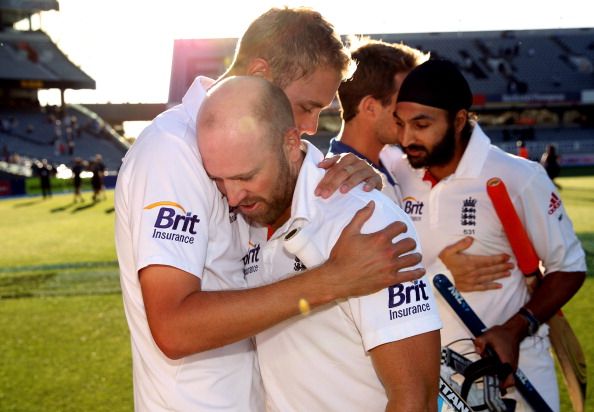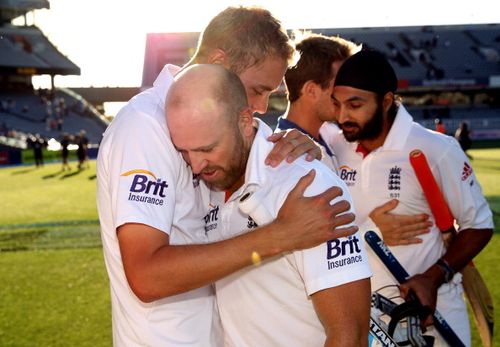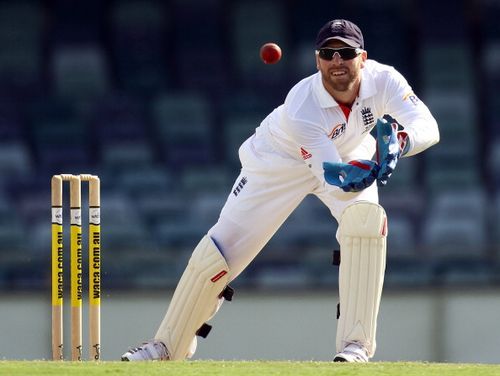
Matthew Prior – England’s number 7 is world number 1
Matt Prior moved into the Top 10 Test Batsmen in the world last week. It is well-deserved recognition for England’s Vice-Captain, who has combined ability, maturity and a fantastic work ethic, to make him the best wicketkeeper/batsman in the world.

Matt Prior of England is hugged by Stuart Broad as he leaves the field with Monty Panesar at the end of day five of the Third Test match against New Zealand at Eden Park on March 26, 2013 in Auckland, New Zealand. (Getty Images)
As Matthew Prior strode off having helped save the game for his side, the 3,000 strong crowd watching in the evening sun rose to applaud him; his team mates warmly embraced him. They like the crowd, knew the importance of the innings. They like the opposition, knew what a selfless player Prior was.
He was accompanied by a tail-ender, often mocked and derided for his lack of batting skills, who had seen through a barrage of bowling at the end of the game, and survived, despite the odd near miss, to earn a crucial draw. Prior, whose second innings had been preceded by an aggressive first innings half-century, fully deserved the plaudits he got.
You could be forgiven for thinking I’m referring to Prior’s stellar game in Auckland against New Zealand last month, where his 7th Test century helped maintain England’s second place position in the ICC World Rankings. In fact, the account is of a game nearly eleven years ago. Sussex were playing Yorkshire in the County Championship, and the tail-ender accompanying Prior was not Monty Panesar, but was his current county coach Mark Robinson. The innings was part of a breakthrough season for Prior, who as a 20-year-old, played a number of key knocks for Sussex, amassing 741 runs as they avoided relegation in their first season in Division One.

File: A Portrait of Matthew Prior of Sussex taken during the Sussex County Cricket Club photocall, April 17, 2002. (Getty Images)
It was clear the boy originally from Johannesburg, via Brighton College, was a precocious talent from the moment he set foot on English shores, aged 11. His batting reflected his youthful looks at first (he had a full head of hair back then), revealing a tendency to play rather loosely early in his innings. Yet his penchant for strong offside play and classy square drives, matched his energetic running, where many a Sussex member glowed that he and skipper Chris Adams were the “fastest pair between the wickets since the days of Paul Parker”, was clear for all to see.
The impact he has had on the international game is thus no surprise for many who saw him in his early years. Yet what has been so enormously impressive is the manner with which Prior has developed his game. Following a character assassination by certain members of the press after his original Test selection, he went away, worked hard on his keeping with Bruce French, got his head down, and came back a better, and more agile cricketer. As one of the fittest members in the England side, his achilles troubles last summer came as an enormous frustration to him, and prevented him from putting in the running which had become a staple of his fitness regime. Yet again, an older, wiser Prior showed his maturity, and turned to cycling as an alternative; he now can regularly be seen kitted up in Lycra pedaling up and down the South Downs, and has spent time training with David Brailsford’s Team Sky in Mallorca. Prior and his mentor, French, even managed to fit in a two-day charity cycle of the South Downs Way into their busy schedule, raising £35,000 for a children’s hospice in the process. The result of all this means the 31-year-old keeper is now fitter than ever, and smashing his previous bests in fitness tests.
Comparisons between Prior and great wicketkeeper batsmen of the ages have become customary. Prior’s outstanding winter has confirmed his elevation above M.S Dhoni, while AB De Villiers has not yet played a sufficient number of Tests as a stumper to judge whether the wicketkeeping duties will adversely affect his extremely impressive batting overall average (50.50). In any case, neither De Villiers nor Dhoni have Prior’s skills behind the stumps; this is revealing, and shows the extent of Prior’s improvement given the difficulty he had with this facet of his game on his first England tour to Sri Lanka back in 2007/8. Two magnificent catches he took off Jonathan Trott and Steven Finn in the final Test against New Zealand lend further weight to this.

File Photo: Matt Prior of England catches a return throw during day one the Tour Match against the Western Australia Warriors at WACA on November 5, 2010 in Perth, Australia. (Getty Images)
Perhaps the most impressive aspect of Prior’s play though is his ability to perform under pressure. His career average, impressive enough at 45.56, tells only one part of the story. He has rescued England from countless difficult situations, and his counter attacking style has been the source of numerous momentum changes within matches.
His assertive play has also been matched with his consistency. Indeed Prior has been a model of this in the number 7 spot for England, regularly tilting the balance of the game in their favour. In 97 Test match innings, Prior has made 34 scores of 50 or more. That’s a rate of 35%. England’s best batsman, Kevin Pietersen, has 52 scores of 50 and above in 161 knocks – a rate of 32%, while M.S Dhoni made averages 39.7, scoring 50 plus 28% of the time. Even the great Adam Gilchrist, although possessing a higher overall average than Prior (47.60) made scores of over 50 in only 31% of his innings.
For whatever reason, perhaps because of a game built around an innate ability to time, as opposed to hit a ball, perhaps because he has never been given a chance to settle in one position, Prior has never quite cracked the one day game at international level. This is made even more peculiar given Prior’s strike rate in Test Matches is an impressive 62.98.
Yet as he moves deeper into his thirties, he may be thankful for the time off this allows him. Steaming between the overs, constantly geeing up the side, Prior really is the engine room of this England team. He, like all of the England players, drives a Jaguar. Like the very best Jaguar engines, Prior can ease smoothly through the gears, power down the throttle when needed, and is incredibly entertaining to watch. Again, like all good Jaguars, with a little care and attention, he can go on for years, and should appreciate in value even with age. Let’s hope for England, that is the case